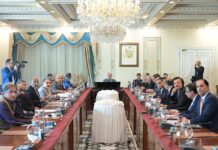The Fair Trade in Tobacco (FTT) has sounded the alarm over Pakistan’s deepening illegal cigarette trade, warning that annual tax losses in the sector now approach Rs400 billion — a blow that threatens national development and public health.
Speaking at a seminar held in Islamabad on Wednesday, FTT Chairman Ameen Virk commended the Federal Board of Revenue (FBR) and its intelligence wings for recent enforcement actions, but said short-term raids are not enough. “This is not a minor leakage; it is a structural crisis that undermines the country’s financial stability,” he stated.
Virk described the illicit tobacco industry as a systematic economic crime, accusing illegal manufacturers of operating openly across the country despite repeated crackdowns. These entities, he said, are evading almost all fiscal responsibilities while violating public health laws by ignoring Pakistan’s Track and Trace System, selling below legal prices, and failing to print mandatory health warnings.
“Every rupee lost to tax evasion in this sector is a rupee not spent on schools, hospitals, or infrastructure,” Virk told a gathering of media professionals, economists, and civil society representatives.
He noted that licensed tobacco firms contribute roughly Rs300 billion annually in taxes, while more than 40 unregistered operators remain outside the tax net, distributing unregistered and non-compliant cigarette brands with near impunity. “They advertise freely and face virtually no consequences,” he added.
FTT welcomed recent seizures of non-compliant brands by Customs Intelligence, Inland Revenue Enforcement Network, and other FBR field units, but urged the government to treat these successes as starting points, not isolated victories.
“One successful raid must lead to ten more. These criminal networks do not pause, and neither should the state,” Virk said, calling for institutional continuity and legal empowerment of enforcement agencies.
He argued that illegal cigarette sales mirror tax evasion trends in sectors like petroleum and real estate, which collectively erode the government’s capacity to deliver critical public services. “If we recovered even half of what is lost annually to this trade, Pakistan would see new hospitals, upgraded schools, and a smaller fiscal deficit,” he asserted.
In closing, FTT issued a strong call for policy coherence, political will, and resource-backed enforcement, urging the state to treat this not just as a revenue issue, but a direct attack on Pakistan’s regulatory and institutional credibility.
“We stand with the government and the FBR,” Virk said. “But we also demand consistency, accountability, and results.”
























